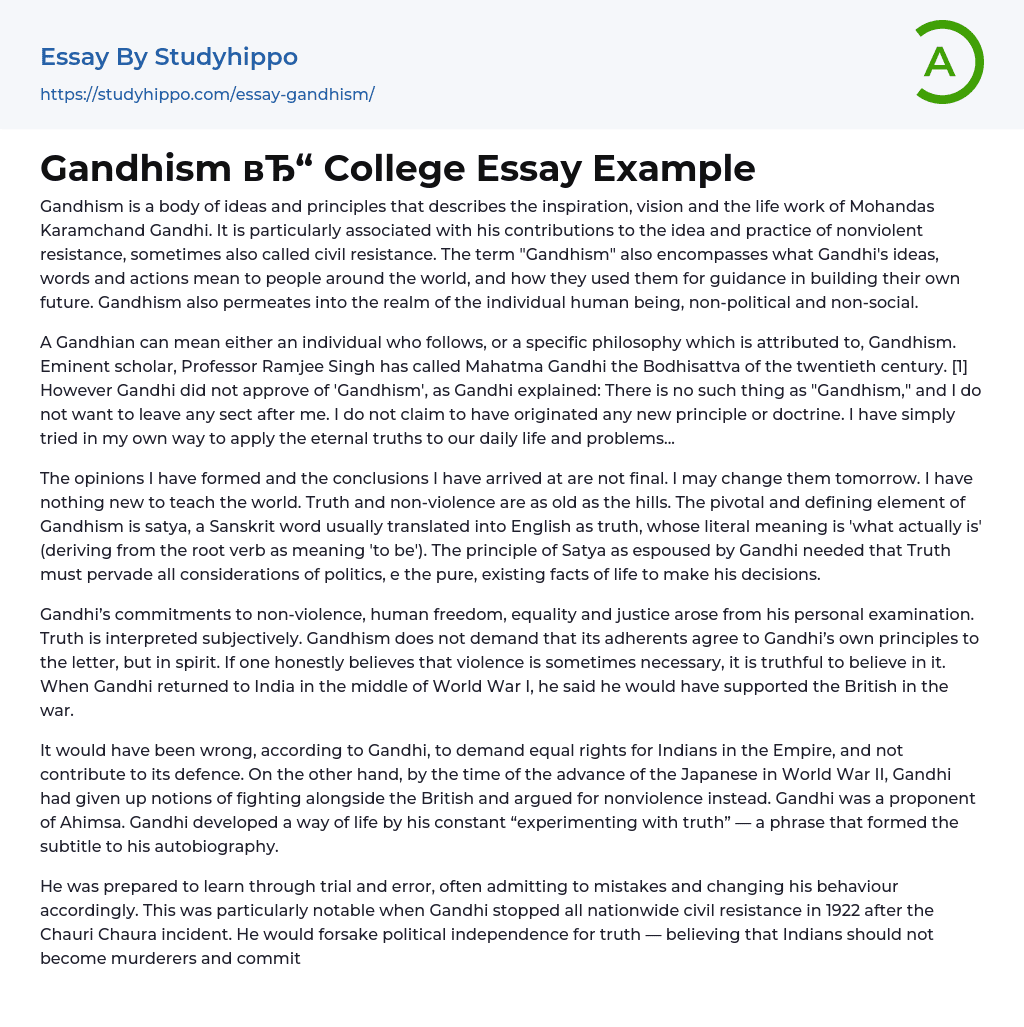Gandhism incorporates Mohandas Karamchand Gandhi's philosophy, principles, and noteworthy contribution to nonviolent resistance. Moreover, it encompasses the global interpretation and application of Gandhi's thoughts, actions, and words by individuals in shaping their own future. Furthermore, Gandhism extends to both personal and non-political aspects of an individual's life.
Gandhism has two meanings, one referring to an individual who follows Mahatma Gandhi's teachings and the other being a philosophy associated with him. Professor Ramjee Singh recognizes Mahatma Gandhi as the Bodhisattva of the twentieth century [1]. However, Gandhi himself rejected the concept of 'Gandhism' and explicitly denied its existence. His objective was not to create a sect or introduce new principles or doctrines but rather to apply timeless truths in our everyday lives and conflicts.
justify">The opinions and conclusions I have reached are not final and may change in the future. I do not have any new teachings for the world. Truth and non-violence have been around for a long time. The quintessential aspect of Gandhism is satya, which means 'what actually is' in Sanskrit. Gandhi believed that truth must be present in all political considerations, as it is derived from the actual facts of life, in order to make his decisions.
Gandhi’s dedication to non-violence, personal freedom, equality, and justice originated from his own introspection. Subjectivity exists in the interpretation of truth. To follow Gandhism, it is not essential to embrace Gandhi's principles verbatim; instead, one must grasp their fundamental values. If someone truly believes that violence is occasionally required, it is a genuine belief. Upon returning to India during World War I, Gandhi expressed that he would have backed th
British in the conflict.
Gandhi held the belief that it would be incorrect to ask for equal rights for Indians in the Empire without also aiding in its defense. However, when Japan advanced in World War II, Gandhi altered his position and advocated nonviolence instead of joining forces with the British. He was a devotee of Ahimsa and molded his lifestyle by continuously "experimenting with truth," which also served as the subtitle of his autobiography.
He was willing to learn by trial and error, frequently acknowledging errors and adapting his behavior accordingly. An example of this is when Gandhi halted all civil resistance across the country in 1922 following the Chauri Chaura incident. He prioritized truth over political independence, reasoning that Indians should not become murderers or commit the same atrocities they accused the British of committing in India. Gandhism focuses more on the essence of Gandhi's quest for truth rather than his ultimate conclusions.
Gandhi's teachings focus on the importance of personal examination and understanding, rather than blindly accepting others or any ideology. He believed that "The Truth is far more powerful than any weapon of mass destruction." Gandhi's philosophy includes ontology and its relationship to truth. Unlike the Greek philosophers who believed existence was solely based on time, Gandhi argued that true existence meant existing within the realm of truth, which he referred to as satya.
Gandhi initially summarized his beliefs by stating "God is Truth". However, through his experiments, he came to the realization that "Truth is God". Gandhi found the first statement inadequate because it could lead to the misconception that he was using truth as a
description of God, instead of recognizing God as an aspect of satya. In Gandhi's philosophy, satya (truth) is considered to be God. It encompasses all the attributes of the Hindu concept of God, also known as Brahman. According to Gandhians, satya resides within each individual as their conscience while simultaneously guiding the entire universe.
- Professor essays
- Should College be Free essays
- Should college athletes be paid essays
- College Education essays
- College Tuition essays
- Graduation essays
- College Goals essays
- Personal Statement essays
- Online Classes Vs Traditional Classes essays
- Online Education essays
- Student Loan essays
- Study Abroad Scholarship essays
- Reasons To Go To College essays
- Paying College Athletes essays
- Technology In The Classroom essays
- Age Of Enlightenment essays
- Ethos essays
- Time essays
- Acceptance essays
- Meaning Of Life essays
- Reality essays
- Natural Law essays
- Political Philosophy essays
- Utilitarianism essays
- Existence essays
- Free Will essays
- Good And Evil essays
- Confucianism essays
- Relativism essays
- Conscience essays
- Environmentalism essays
- Empiricism essays
- Epistemology essays
- Ethics essays
- Existentialism essays
- Human Nature essays
- Individualism essays
- Metaphysics essays
- Philosophy Of Life essays
- Transcendentalism essays
- Truth essays
- Destiny essays
- Determinism essays
- Fate essays
- Functionalism essays
- Philosophers essays
- Pragmatism essays
- Future essays
- Child Observation essays
- Critical Reflection essays




